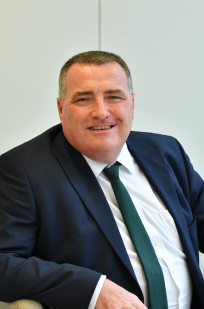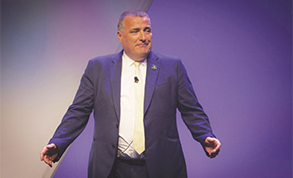Comment / Common challenges
 It was my pleasure to represent the association at the US HFMA national conference in Denver in late June (pictured below). I found it both educational and reassuring.
It was my pleasure to represent the association at the US HFMA national conference in Denver in late June (pictured below). I found it both educational and reassuring.
It is clear that the NHS operates a very different model to the American system. But we face the same challenges as we look to establish a stable and sustainable future.
Health leaders in the UK are faced with the challenge of maintaining our contract with the public. This means delivering healthcare freely at the point of need through the constrained universal state-funded system.
And this is in the context of needs having increased in recent years and inequalities exposed.
At the same time, our colleagues in the US face the challenge of reframing their system more around population health, moving away from the fee-for-service approach that has historically been the service’s main source of revenue.
There is a lot of common ground that will need to be covered as the two services strive to achieve their goals. Both are looking to enhance integration and collaboration in service delivery and to transform care through digital technologies.
Developments in digital medicine, genomics, artificial intelligence and robotics have a huge potential to transform the delivery of healthcare.
I am delighted that the HFMA has been delivering a programme of work to increase awareness among NHS finance staff about digital healthcare technologies.

The aim is to enable finance teams to take an active role in supporting the use of these technologies to drive value and efficiency.
In July, the government announced the NHS pay settlement for 2022/23. In England, Wales and Northern Ireland, the £1,400 increase for agenda for change staff equates to a different percentage rise depending on banding.
But the pay review body said the pay settlement would increase the overall agenda for change pay bill by an average of 4.8%.
This settlement is, of course, significantly higher than the 3% anticipated when NHS budgets were set, with the result that the service is now required to make up the difference from existing budgets.
This will inevitably have an impact on the health service’s ability to meet the needs of patients and government expectations. Given August’s news that inflation had risen above 10% for the first time in 40 years, the NHS pay deal will feel to many like a real-terms pay cut.
While health and care staff are motivated by more than just pay, it is clear that this position will lead to unrest among staff, increasing the risk of further loss of staff to other sectors. It also increases the risk of industrial action as we approach what already promises to be an extremely challenging winter.
This challenge is, of course, further exacerbated in Northern Ireland given the lack of a functioning Assembly and executive to take the necessary funding decisions that will progress these issues.
While winter is always a busy period in the NHS, this year will be particularly challenging due to the sustained high demand for our services.
Reports suggest NHS emergency departments have had their busiest summer ever. This is already requiring the system to do everything possible to free up capacity to improve flow through hospitals, including improving timely discharge, strengthening social care and providing better support to community services.
These pressures are likely to further challenge our ability to meet the targets of the elective recovery programme, given the impact on workforce availability and the prevailing financial constraints across health and social care.
Contact the president on [email protected]
Related content
This webinar series offers colleagues of ICS organisations the opportunity to discuss common priorities, challenges, and successes within their field.
We are excited to bring you a fun packed Eastern Branch Conference in 2025 over three days.